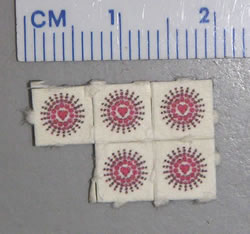2,5-Dimethoxy-4-bromoamphetamine
(Redirected from 2,5-dimethoxy-4-bromoamphetamine)
2,5-Dimethoxy-4-bromoamphetamine[edit | edit source]
2,5-Dimethoxy-4-bromoamphetamine (DOB) is a psychedelic drug and a substituted amphetamine. It is a member of the 2C family of phenethylamines and is known for its potent hallucinogenic effects.
Chemical Structure[edit | edit source]
2,5-Dimethoxy-4-bromoamphetamine is a substituted amphetamine with the chemical formula C11H16BrNO2. It features a bromine atom at the 4-position of the phenyl ring, and methoxy groups at the 2- and 5-positions. The presence of these groups contributes to its psychoactive properties.
Pharmacology[edit | edit source]
DOB acts primarily as a serotonin receptor agonist, particularly at the 5-HT2A receptor. This interaction is responsible for its psychedelic effects, which include alterations in perception, mood, and cognition. The drug is known for its long duration of action, often lasting 12 to 24 hours.
Effects[edit | edit source]
The effects of 2,5-Dimethoxy-4-bromoamphetamine can vary widely among users but typically include:
- Visual and auditory hallucinations
- Altered sense of time
- Enhanced sensory perception
- Emotional changes
- Increased energy and alertness
Synthesis[edit | edit source]
The synthesis of DOB involves the bromination of 2,5-dimethoxyamphetamine (DMA) using a brominating agent. This process requires careful control of reaction conditions to ensure the selective substitution at the 4-position.
Legal Status[edit | edit source]
The legal status of 2,5-Dimethoxy-4-bromoamphetamine varies by country. In many jurisdictions, it is classified as a controlled substance due to its potential for abuse and lack of accepted medical use.
Related Compounds[edit | edit source]
DOB is structurally related to other psychedelic phenethylamines, such as 2C-B, 2C-I, and 2C-E. These compounds share similar mechanisms of action and effects but differ in potency and duration.
Related Pages[edit | edit source]
Search WikiMD
Ad.Tired of being Overweight? Try W8MD's physician weight loss program.
Semaglutide (Ozempic / Wegovy and Tirzepatide (Mounjaro / Zepbound) available.
Advertise on WikiMD
|
WikiMD's Wellness Encyclopedia |
| Let Food Be Thy Medicine Medicine Thy Food - Hippocrates |
Translate this page: - East Asian
中文,
日本,
한국어,
South Asian
हिन्दी,
தமிழ்,
తెలుగు,
Urdu,
ಕನ್ನಡ,
Southeast Asian
Indonesian,
Vietnamese,
Thai,
မြန်မာဘာသာ,
বাংলা
European
español,
Deutsch,
français,
Greek,
português do Brasil,
polski,
română,
русский,
Nederlands,
norsk,
svenska,
suomi,
Italian
Middle Eastern & African
عربى,
Turkish,
Persian,
Hebrew,
Afrikaans,
isiZulu,
Kiswahili,
Other
Bulgarian,
Hungarian,
Czech,
Swedish,
മലയാളം,
मराठी,
ਪੰਜਾਬੀ,
ગુજરાતી,
Portuguese,
Ukrainian
Medical Disclaimer: WikiMD is not a substitute for professional medical advice. The information on WikiMD is provided as an information resource only, may be incorrect, outdated or misleading, and is not to be used or relied on for any diagnostic or treatment purposes. Please consult your health care provider before making any healthcare decisions or for guidance about a specific medical condition. WikiMD expressly disclaims responsibility, and shall have no liability, for any damages, loss, injury, or liability whatsoever suffered as a result of your reliance on the information contained in this site. By visiting this site you agree to the foregoing terms and conditions, which may from time to time be changed or supplemented by WikiMD. If you do not agree to the foregoing terms and conditions, you should not enter or use this site. See full disclaimer.
Credits:Most images are courtesy of Wikimedia commons, and templates, categories Wikipedia, licensed under CC BY SA or similar.
Contributors: Prab R. Tumpati, MD






